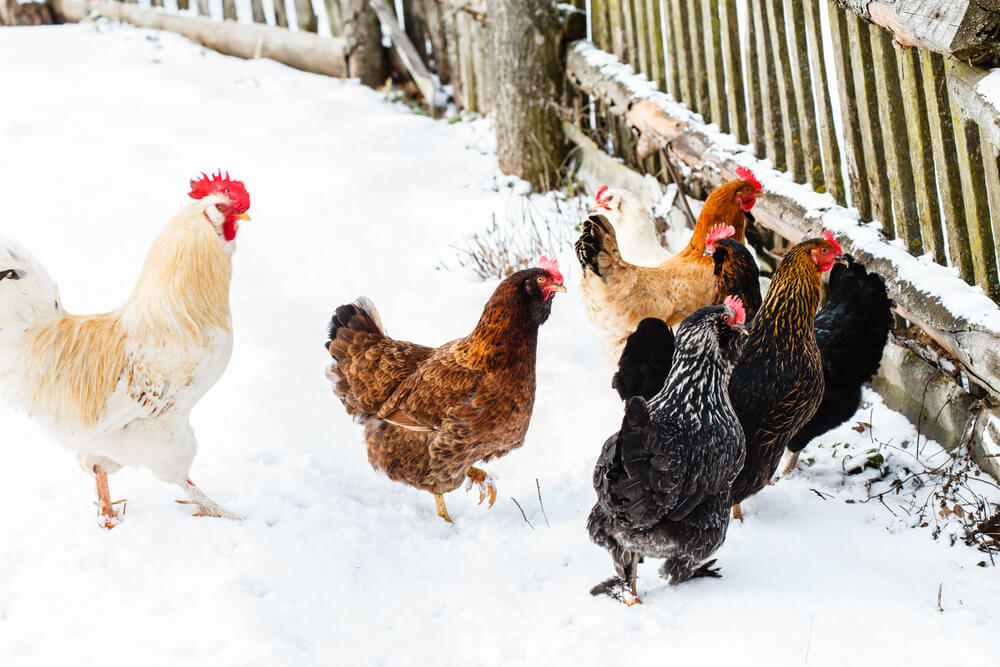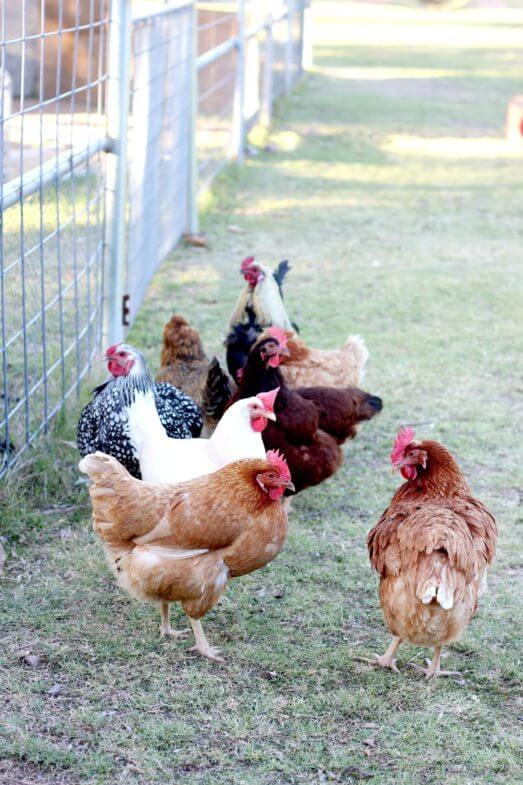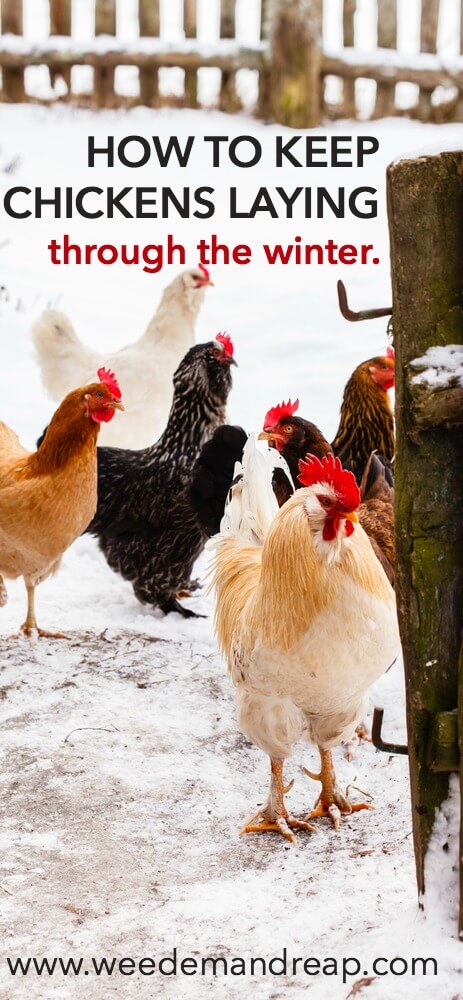
Oh my gosh, isn’t life terrible right now with all the snow and icicles and frostbite?
Yeah…that’s not really what I’m dealing with here in Arizona.
You see, ’round here this time of year we’ve got grass, and leaves, and maybe a bit of wind?

Still, just like the rest of you folks, our chickens like to take a break from laying eggs in the winter. This can be problematic when you become so spoiled with farm fresh chicken eggs that any other egg tastes like rubber to you.
How to keep chickens laying through the winter
Biologically, what happens to your chickens in the winter is a result of those freezing temps and shorter days. Egg laying can only happen if the chicken’s body has the right amount of energy as well as hormone production. Winter drastically reduces both.
The good news is there are definitely some things that you can do to give your chickens support during the winter. By changing just a few things to our chicken routine, we were able to go from zero eggs to about 2 a week from each chicken.
Think higher protein, more light and heat at night.
- Higher protein feed – As you can imagine, it takes a lot of energy for a chicken to stay warm in frigid temperatures. Higher protein helps provide enough nutrition to keep your chickens healthier through the winter. I typically go for an 18-20% feed (look for broiler chick grower or finisher) and feed that when temps are coldest from Nov-Feb.
- More artificial light – As the days get shorter during the winter, so does the hormone production in chickens. A hen needs a certain amount of sunlight in order for the pineal gland in her brain to regulate her melatonin and therefore produce eggs. More sunlight = more eggs. Providing just 2-4 extra hours of light on the hens will help their bodies produce more eggs. Here is the clamp brooding light we use.
- More heat in the coop – Prepping the coop so that the hens are cozy at night will really help with their overall health and egg production. It’s so important to build a good, adaptable coop for exactly this reason. We typically cover the coop with a tarp and then let the light provide extra heat, but if you live in a colder area, you may need to provide a red heat lamp (like this one) all night.
I definitely don’t believe in forcing your chickens to produce as well as they do in the summer, but I believe giving them support during the winter will not only make your chickens healthier, you also may get a few more eggs a week as payback!


Hi,
I know this isn’t directly related to this article, but it does relate to keeping chickens as healthy as possible, so hopefully you’ll let it slide. 😉
Do you ferment your chicken’s feed? I’ve read a lot about pros of doing this, but I also know a lot of people don’t. We just got our first chickens (17 egg layers), and I think next year we’ll try our hand at raising meat birds. Any thoughts would be much appreciated! Thank you!
Hi Kristin-
On DaNelle’s “Resource” page she has the chicken feed she uses: https://www.weedemandreap.com/resources/
This feed that she suggests is a good one for fermenting, but doesn’t have to be. Fermenting can increase nutrition and reduce the amount they need to eat resulting in less cost for you. It does take more time, but has a lot of benefits.
So, really up to you if you want to spend the time. And if you can’t ferment it all of the time, giving a high quality food and sometimes appropriate table scraps will keep your chickens healthy.
Thank you -Bobbi (DaNelle’s Assistant)
hi my name is deana howell . I have 14hens 2 rooster I get 12 eggs a day .what can I feed my chickens in the winter. I live in wileyville w.v . the wealther is getting cold it is staying about temp 39 at night.do you let the chickens out at all.do they need a heatbulb to keep warm. I put scrapes of food out for them .they have plenty of water . thank you
Hi Deanna-
With DaNelle being in Arizona, winter weather isn’t that much of a concern.
These two articles will give you tips for caring for your chickens in the winter months:
https://extension.umaine.edu/publications/2217e/
https://ohioline.osu.edu/factsheet/anr-66
Best of luck with your chickens! Stay warm!
Thank you -Bobbi (DaNelle’s Assistant)
I live 700feet up in North Wales. It is February here, mid-Winter, a bit of snow this morning. We have 11 hens and they produced 9 eggs yesterday and 8 the day before. In Winter the only thing I do is shut off most of the ventilation leaving just one side slightly open. I clean the litter from the coop first thing every morning as you can’t risk any ammonia build up and keep adding straw so that it gets pretty deep in there. Sort of a deep litter method but without the poop. They get let out at dawn and have access to mash all day. Within an hour or two of dawn they get hot dinner – potato, cabbage, cauli, etc and left over peelings all chopped up and boiled for 25mins – includes garlic clove and turmeric if available. Add to that a scoop of their mash and serve that in a couple of trough feeders. Finally as dusk arrives they get corn, sometimes lettuce and I draw their attention to the remains in the trough. They go to the coop with full crops which will keep them warm through the night. Close the door once they are in – don’t leave it late. Make sure there are no drafts.
Ok so they are spoilt hens but they are in absolutely peak condition and that is how you get eggs through the Winter. And by the way they are rescued hens rejected by an intensive farm and were on their way to slaughter when we got them.
I like your choice of giving your flock organic veggies, because chemical fertilizers and pesticides are as bad for them, as it is for you. I do not force my hens to lay as many eggs in the winter with artificial lights, unless like with commercial egg producers, you will be processing your spent hens every 2 to 3 years. You would have to have a rooster to have fertile eggs to incubate yourself in an incubator, because while a hen hatches out her own chicks, she will take about 6 weeks off to hatch and brood her chicks during the summer, reducing your summer supply of eggs. If you are going to let the poop lay on the floor of the coop or run, cover it with lots of leaves and grass cuttings, weeds, veggie scraps, etc. so the heat comes from the compost, for poultry health reasons. I pick Hot peppers and dry them, seed and all,(the seed are the hottest part of the plant) in a paper bag, in my pantry (keeps bugs out there, too) and feed them to my flocks on the coldest days to raise their body’s BTU’s which keep them warmer and more comfortable. i never put lights inside my coops, because they attract predators, but I do have solar motion detecting lighting, facing away from the coops, all around the coops, to keep the varmints away!
I don’t force my hens to lay during winter. The way I see it is they lay for the most part every day or like mine every other d. ay. All Spring,Summer and Fall until they only of course. So seeing as they provide me w/eggs the biggest part of a year I feel they earn a break. Of course my hens are just beginning to lay so they will continue to do so till there first mold this coming fall. I do agree w/ adding more protein to there diet. I give mine a hand full of dog food once a week. Plus nuts on very cold days. They go crazy over the dog food and this is what my Father and his Father has done. Our chickens always laid a lol bit thru the winter.
My chickens I free range started disappearing every so often and I couldn’t find them on our 5 acres? Come to find out my 8 chickens found their way off the property and was going over to my neighbor’s that left their dog outside with the dog food out on the ground. Luckily the dog didn’t care sharing with the chickens! But once I figured out where my chickens were going I had to fix it where they couldn’t get out off our property again. Up till that point I had no idea that chickens loved dog food too! I didn’t know if it was good for the chickens or not to eat dog food? I plan on getting another 16-22 chickens eventually, since I made a big enough coop/Run/tractor to house 30-36 chickens. Been letting the 8 I have now just free range. But keeping them out of flower gardens are near impossible among getting into other things they shouldn’t. So keeping them in the coop run tractor and rotate it around on the 5 acres might be my best solution? I was considering trying to raise mealworms for the chickens? Is dog food as good for the chickens as the mealworms you think?
Hi Gale-
Yes, chickens love dog and cat food! It’s fine if they eat it as long as it’s not their sole source of food. It’s a great option to increase their protein intake in the winter. Mealworms are great too! You can look to see which has more protein, mealworms or dog food, and feed according to the protein needs of your chickens. Dog food may be easier to obtain and feed, but if you have the ability to raise mealworms they would make a good feed source.
Thank you -Bobbi (DaNelle’s Assistant)
I live in southwest Ontario(Canada) and my coop is not heated, but insulated well. It is December 17 here and out night time temps are around 5 Fahrenheit and daytime temperatures of 26 Fahrenheit. We have 4 hens and since July we average 3-4 eggs per day. Since it has been cold (December) I fed them some “chicken scratch” as well as their regular crumble and their egg production has not changed. Lights in the coop go on at 6am, the doors open at 7:30am and, if not snowing out they go into a area that I have cleared the snow from. (My hens will not go in the snow if more then 1 inch deep.)
I totally understand what she is trying to do and giving the girls some extra warmth in the winter I’ll all for it.
But I am astonished at the poor condition of the coop and property if your posting it for others to follow. Really, you can’t put on a new tarp and clean the coop before you shot this. Maybe I’m a little over kill but I clean my coop every morning. Every night their run is raked clean too. The roosting bars in my coop come out and once a week they are taken out and scrubbed clean. I have to say I’m lucky enough to have access to running water with a 100′ hose so I don’t have to schlep water but I’d still clean even if I didn’t. If you keep up with it from the start it doesn’t take long at all.
I’ve read several postings that say not to clean the poop in the colder months because it creates heat in the coup. Hopefully this helps you understand her practice. I have adopted this idea and it does work!
Good on ya
I have to agree. The state of the coop really surprised me. We all know chickens are messy, and they poop everywhere, but, those nesting boxes looked unsanitary at best.. If I were filming my coop, I would at least clean it up a bit, especially if my egg customers were potentially going to see the state of my coop.
My coop is set up so the hens cannot sit on or over the nest boxes, which means the boxes stay pretty clean. I monitor the nest bedding to keep it free of droppings or what have you, and freshen the material as needed. The droppings boards are scraped daily, and I am investing in a new method using sweet pdz where it is something like a litter box of sorts. The droppings board under my roosting bars will have a ridge to contain the pdz, and the droppings will be collected like cat droppings in a litter box. Til then, just keeping it scraped and dusted with DE works wonders.
I live in Northern New Mexico which is a BUNCH colder than Gilbert, AZ. That being said, I have had much success using LED rope lights in the coop and covered run. It gives my girls extra light and I don’t have to worry about the coop going up in flames. The lights go on in the morning about 6 am when I do the morning chores; I then go to work; get home and do the evening chores and turn off the lights about 6 pm. I average a dozen eggs a day with 24 hens. I make sure they have plenty of fresh water and schep water to them each morning in a 5 gallon bucket. We will be putting a water hydrant closer to the coop this spring/summer so we can use a hose.. The hens and ducks get fresh organic greens every morning, even in the winter, and we give them Lisa Steels special mix with their layer feed year round. A little pricier I am sure but the results are worth it. I am able to sell the eggs, which pays for most of the extra cost, and everyone wins. The goats, I have Kinder goats, will be ready to breed this year. Not sure If I am read for that. Love your posts. Especially doing your own slaughtering. Hubby and I have really had some deep conversations on that topic. Keep up the good blogging kiddo!!
Where do you get Lisa Steel’s chicken feed from? What is schep water?
Love to see photos of your coop.
Thank you!
Pam
I love this idea Rita!!! Not least to make my chicken run look super festive!!! Great tips in the article Danelle – I’ve owned chickens on and off most of my life but this will be the first winter with snow to contend with! Oh Pam, the Lisa Steel custom mix can be found here https://www.fresheggsdaily.com/2012/07/new-and-improved-breakfast-of-champion.html and I think Rita just meant she schleps the water out to the run by hand each morning.
Pretty sure she means “schlep”, which is a yiddish word for hauling or carrying, especially something heavy or awkward.
That’s a great idea for providing lighting. It’s my first winter with my girls and I’m nervous that I won’t provide with everything they will need. LED rope lighting is a wonderful idea, no fires and it will provide extra hours of lighting and security. Thanks!